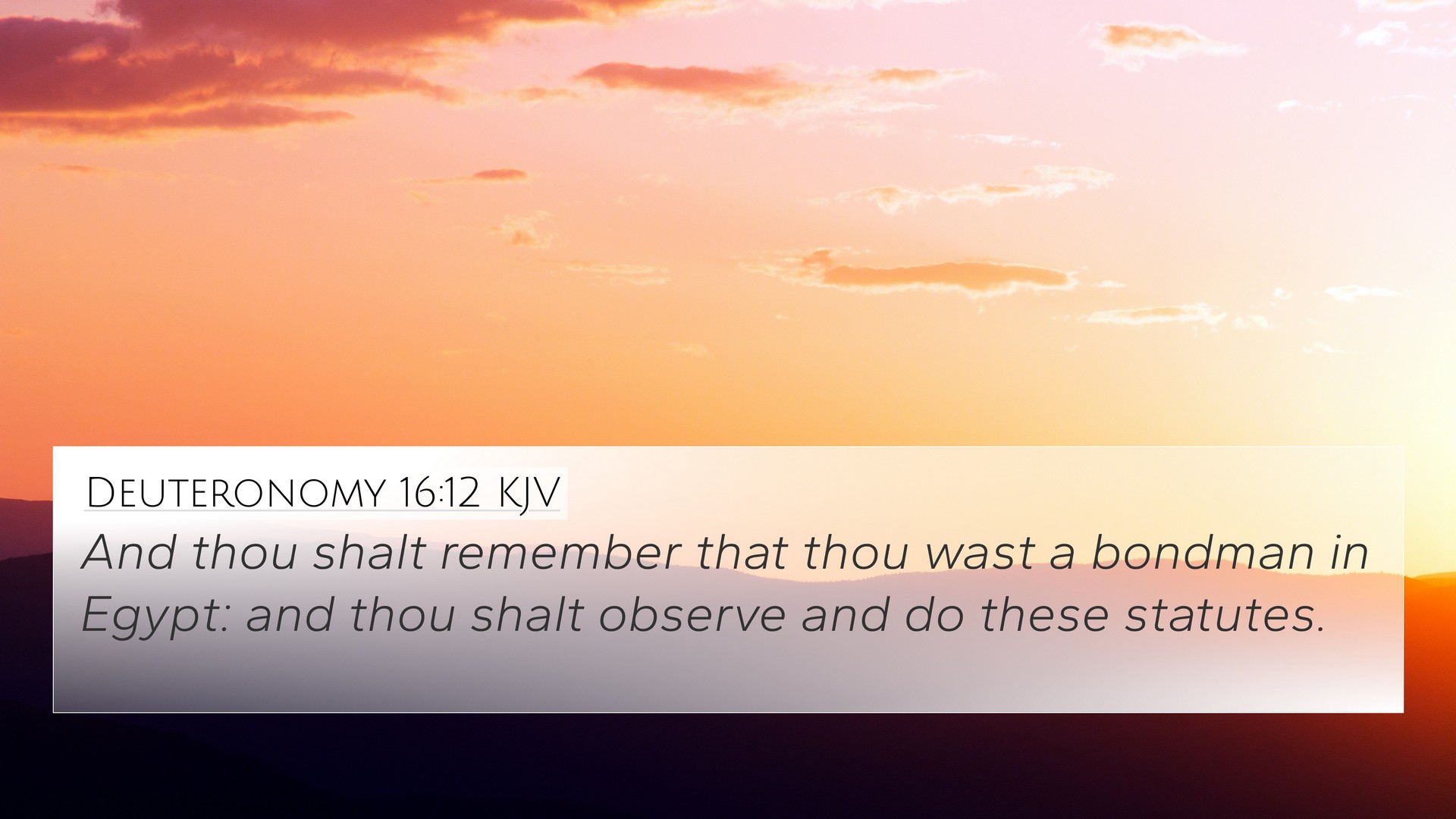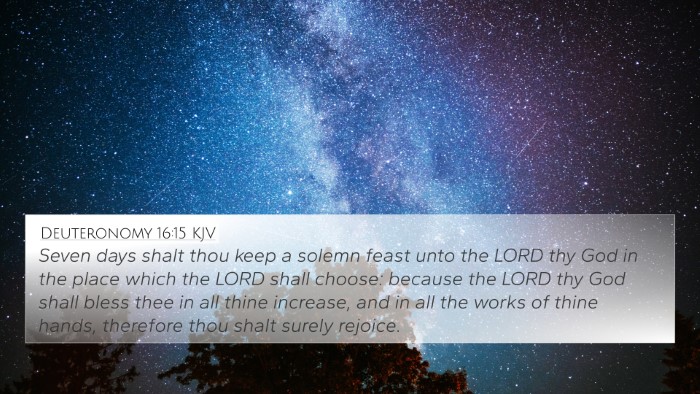Deuteronomy 16:12 - Summary and Interpretation
Bible Verse: Deuteronomy 16:12 - "And thou shalt remember that thou wast a bondman in Egypt: and thou shalt observe and do these statutes."
Meaning and Significance
The verse from Deuteronomy 16:12 carries profound implications and calls the Israelites to remember their past as bondmen in Egypt. This remembrance is not merely a historical note but serves a deeper purpose in shaping their identity and moral obligations.
Insights from Public Domain Commentaries
- Matthew Henry: Emphasizes the importance of remembrance and the moral implications it has on one’s actions. He posits that acknowledging their past as slaves in Egypt should lead them to be compassionate and just in their dealings with others.
- Albert Barnes: Points out that this command serves as a reminder of the mercy shown to them by God. It urges them to live in a manner that reflects gratitude and obedience to God’s statutes.
- Adam Clarke: Discusses the role of memory in moral and ethical behavior. He highlights that the observance of God’s laws stems from a remembrance of their former condition, which compels them to adhere to justice and care for others.
Cross-References
This verse is richly connected with several other scriptures, highlighting the theme of remembrance and the obligation towards others:
- Exodus 20:2-3: "I am the Lord thy God, which have brought thee out of the land of Egypt, out of the house of bondage."
- Leviticus 19:34: "But the stranger that dwelleth with you shall be unto you as one born among you, and thou shalt love him as thyself; for ye were strangers in the land of Egypt."
- Psalms 105:5: "Remember his marvellous works that he hath done; his wonders, and the judgments of his mouth."
- Micah 6:8: "He hath shewed thee, O man, what is good; and what doth the Lord require of thee, but to do justly, and to love mercy, and to walk humbly with thy God?"
- Matthew 25:35: "For I was an hungred, and ye gave me meat: I was thirsty, and ye gave me drink: I was a stranger, and ye took me in."
- Galatians 5:13: "For, brethren, ye have been called unto liberty; only use not liberty for an occasion to the flesh, but by love serve one another."
- Romans 12:1: "I beseech you therefore, brethren, by the mercies of God, that ye present your bodies a living sacrifice, holy, acceptable unto God, which is your reasonable service."
Thematic Connections
The theme of remembering one's history and its implications resonates throughout the Bible, providing a foundation for understanding how past experiences shape current responsibilities. The call to observe God’s statutes is reinforced across various texts as a continual reminder of the covenant relationship that dictates conduct among individuals.
Comparative Bible Verse Analysis
Through comparative Bible verse analysis, we can identify how different Scriptures echo the sentiment of remembering and obeying God's commandments:
- Connections between Bible verses: This verse ties back to the Exodus narrative, emphasizing escape from slavery and the resulting obligation to God and humanity.
- Bible verses that relate to each other: Verses such as Ephesians 2:12-13 parallel the liberation from sin and oppression, inviting believers to remember their redemption and live accordingly.
- Inter-Biblical dialogue: The recurring theme of compassion for the oppressed is found in various prophetic writings illustrating God’s concern for justice and equity.
Using Cross-References in Study
Understanding the context of Deuteronomy 16:12 can be enhanced through tools for Bible cross-referencing. Using a Bible concordance or cross-reference guide enables deeper insights into interconnected biblical themes and teachings.
Study Methods
- Cross-referencing Bible study: Utilize thematic studies to explore connections between the Old and New Testament, focusing on God's covenant and human duties.
- Bible chain references: Trace a narrative or theme through different books, analyzing how each author contributes to the overall message regarding remembrance and obligation.
Conclusion
Deuteronomy 16:12 serves as a powerful reminder of the past that informs present actions. By observing such statutes, individuals not only honor their heritage but also affirm their commitment to a just and compassionate life in accordance with God’s commands. Engaging with cross-references enriches understanding and applies biblical principles to everyday life.








